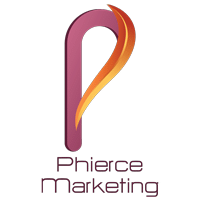Digital marketing may be the most important investment you can make to grow your business. It helps you attract the right customers, zeroing in on the burning questions and pain points that drive buying behavior. Done right, it is repeatable, reliable, and affordable for businesses of all sizes.
There’s a caveat. Effective digital marketing isn’t as simple as “getting to page 1 on Google.”
No one digital marketing tactic is enough to help your business reach its full potential. You need a complete digital marketing strategy, where different elements work together to deliver real results.
In The Phierce Guide to Digital Marketing, you’ll get the facts on what a real digital marketing strategy looks like. Consistency is the name of the game. You’ll need to get more than one plate spinning – and keep them spinning – if you want to outperform the competition.
The results are worth it: Lasting advantages in visibility, lead generation, and conversions the “other guy”can’t overturn just by spending more money. The sooner you start, the sooner you will see results.
Let’s dive in and look at a complete digital marketing strategy.
1. Content Marketing
Content marketing is the cornerstone of any digital marketing strategy.
In short, you can’t market unless you have something your leads want to see. Content marketing is that something: Informative, helpful material you publish online to help viewers achieve a goal that matters.
Content marketing is intended to capture attention in the earliest (Awareness) stage of the buyer journey when someone has just realized they have a problem or question you might be able to help with. They are some time away from being interested in a solution. What they need is information.
When your content provides that information, you have the opportunity to position yourself as a trusted advisor through the rest of the process. You can help leads decide what a solution looks like, then guide them to choose the right one – which just may be yours.
Traditionally, blog posts have been the most common form of content. Likely, they always will be.
When you launch a content marketing strategy, the process starts by researching keywords – the actual words and phrases real people type into search. Keywords represent the question or problem, but they are usually too vague to suggest exactly how you should approach the answer.
That, in turn, is handled by choosing the right topic. The topic addresses an important aspect of the keyword and gets your lead reading. A good topic helps them move forward on resolving their issue.
- For example, a keyword might be: social anxiety
- A topic might be: Surviving a Party with Social Anxiety
By publishing and sharing content on a regular basis, you have the opportunity to preview the value you offer to customers. They can start to feel they know, like, and trust you. They are far more likely to not only listen to your advice but actually follow through – improving the outcome for everybody.
After researching keywords and selecting topics, most organizations should aim to post one substantial blog a week – think 800 words or more. Once this is an easy bar to clear, go to two or even three blogs.
2. Email Marketing
Your email marketing list is one of your most important business assets. Subscribers to your list are far more eager to respond to your offers than the average website visitor is. Plus, they are more likely to hear about those offers than social media followers are.
Your content marketing and email marketing are closely related. To entice people to join your email list, you’ll usually need a lead magnet: A piece of valuable, sophisticated content leads can act on right away. They agree to join your list to gain access to that content, knowing they can unsubscribe at any time.
While some people unsubscribe immediately after getting what they want, most will stay on your list – at least for a while. You build trust and encourage loyalty when you send helpful content to your list. The longer subscribers stick around, the more likely they are to buy from you.
3. Video Marketing
More than 80% of traffic on today’s internet is video. Memorable and convenient, video may just be the most powerful online marketing tool there is. Having a video on a product or service page makes it more likely that a visitor will buy, even if they don’t stop to watch the video. It’s that good.
Video also motivates more engagement, including likes, comments, and shares.
Social media accelerates results from the rest of your digital marketing strategy by expanding the reach of your content. Instead of sweating over a lengthy, value-packed blog post, sending it into the world, and hoping for the best, you can use social media to attract attention from your ideal customers. A strong social media strategy doesn’t mean trying a little bit of everything. Instead, you identify your core audience, discover where they’re most active, and meet them where they are. Depending on your business, that may be Facebook, Twitter, LinkedIn, or even a niche platform like Reddit. Each social media network moves at its own pace. It may be enough to post once a day on Facebook, but to get noticed on Twitter, you could need 6-8 posts a day. On top of that, each network has its own uses: Facebook is great for staying in touch with current and past customers, for instance. With all that in mind, the best social media campaigns are data-driven. A digital marketing agency can analyze posts to see what resonates with your followers, then focus on creating more of what works. SEO (short for search engine optimization) ties it all together. SEO is a combination of techniques in website design, marketing, and user experience. It helps make your website easier to use while also laying the groundwork for you to appear in online searches related to your business. SEO starts with a variety of adjustments to your website’s design to make it faster, more secure, and easier to navigate, especially on mobile. It then continues into your content marketing, ensuring your published content uses the right words and phrases to connect with lucrative search traffic. Digital marketing may sound like lots of work, but it empowers you to grow and scale your business like nothing else. Most importantly, you don’t have to go it alone: With proven expertise from experienced marketers, you’ll start seeing results within weeks or months rather than years.5.SEO




